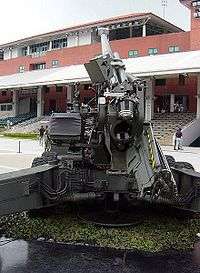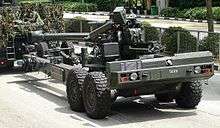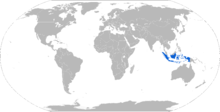FH-2000
The FH-2000 or Field Howitzer 2000 was developed by Singapore Technologies for the Singapore Army. It is a 155 mm/52-calibre towed howitzer gun. It fires projectiles to a maximum range of 42 kilometers using special extended range ammunition, that was field tested in New Zealand. It has a crew of eight and uses a 75 hp diesel auxiliary power unit to give it a self-propelled speed of 16 kilometers an hour movement without towing.
| FH-2000 | |
|---|---|
 The FH-2000 155mm/52calibre Howitzer | |
| Type | Howitzer |
| Place of origin | Singapore |
| Service history | |
| In service | 1993 – present |
| Used by | See Users |
| Production history | |
| Designer | ST Kinetics[1] |
| Designed | 1990 |
| Manufacturer | ST Kinetics[1] |
| Produced | 1993–1995 |
| Variants | FH-88 |
| Specifications | |
| Mass | 13,200 kg (29,100 lb) |
| Length | 12.90 m (42 ft 4 in) (firing) |
| Barrel length | 8.06 m (26 ft 5 in) L/52 |
| Width | 9.73 m (31 ft 11 in) (firing) |
| Crew | 6 |
| Caliber | 155 mm NATO |
| Breech | Semi-automatic Interrupted screw with electronic rammer |
| Carriage | 6 wheeled split trail |
| Elevation | -3°/+70° |
| Traverse | ±20° from centerline |
| Rate of fire | 6 rpm for 3 minutes 2 rpm for 30 minutes |
| Effective firing range | 19 km (12 mi) (with M107)[1] |
| Maximum firing range | 40 km (25 mi) (with ERFB BB round)[1] |
| Feed system | hydraulically powered flick rammer assisted loading |
| Engine | Air-cooled turbo charged diesel 75 hp (56 kW) |
| Maximum speed | 10 km/h (6.2 mph) |
Development

The FH-2000 is a development of the FH-88 gun system, which was first produced in 1983 and uses many of the same components. Development of the FH-2000 began in 1990, with the first prototype produced in 1991. The initial prototype was developed further, and acceptance tests were completed in December 1993. The gun differs in a number of ways from the earlier FH-88 most notable is the longer 52 calibre barrel as compared to the 39 calibre barrel of the FH-88.[2]
Additionally, ST Kinetics assisted Turkey in the design and manufacture of its own 155mm/52calibre Panter towed howitzer system, which is understood to be based on the FH-2000 design but upgraded locally with an uprated diesel Auxiliary Power Unit (APU) of 160 hp instead of the original 75 hp, thus giving it a self-propelled speed of 18 km/h as compared to 10 km/h for the FH-2000.[3]
Design
The firing platform, when fully deployed, support the howitzer using a tripod mechanical structure. Firing loads are transmitted to the ground through this tripod, isolating the hydraulic cylinders of the platform, which provides for greater reliability. The FH2000 can be fitted with a series of sighting systems from optical to electro-optical. These sighting systems can be linked to the fire control computers. The breech mechanism is semi-automatic. The breech opens automatically during counter recoil. An electronically controlled and hydraulically powered flick rammer rams the projectile into the barrel chamber with high consistency.[4]
History
Deployment
By 1995, 18 guns were deployed with the 23rd Singapore Artillery Battalion in three batteries of six guns. The gun has been offered for export, and the Indonesian army has taken delivery of a number of these units.[5]
1997 incident
On 9 March 1997, a 155mm artillery round exploded in the barrel of a FH-2000 gun howitzer during a live firing exercise conducted by the 23rd Battalion of Singapore Artillery at the artillery range of Waiouru Army Camp, near Waiouru in New Zealand. This resulted in the deaths of two full-time national servicemen, Third Sergeant Ronnie Tan Han Chong and Lance Corporal Low Yin Tit. 12 other servicemen were injured in the incident, including a Staff Sergeant from New Zealand Army, who was acting as the New Zealand Defence Force liaison officer/observer to the visiting SAF battalion.
A Committee of Inquiry found that the most probable cause of this incident was a faulty artillery fuze that was fitted to the 155 mm projectile which had been loaded into the gun howitzer that resulted in the premature detonation. Subsequently, Chartered Industries of Singapore conducted an X-ray check on the same batch of fuzes from where the faulty fuze was taken from and found that approximately 1.3% of these fuzes were faulty.
The families of the two deceased SAF servicemen were compensated as well as the other injured servicemen. Various SAF and New Zealand personnel were also awarded, in recognition of their acts of bravery and professionalism during the incident.[6] Lieutenant-Colonel Toh Boh Kwee, First Warrant Officer Mohinder Singh, First Sergeant Teo Boon Hong and Lieutenant Leroy Forrester NZDF received the Pingat Jasa Perwira (Tentera) for risking their lives to help injured soldiers immediately after the explosion.[7]
Operators

Current operators
See also
References
- FH-2000 Brochure. Archived 2011-09-28 at the Wayback Machine Retrieved on August 27, 2008.
- Foss, Christopher F., ed. (2007). Janes Armour and Artillery 2007–2008 (28th ed.). Coulsdon, Surrey: Janes Information Group. p. 908. ISBN 0710627947.
- Foss, Christopher F., ed. (2007). Janes Armour and Artillery 2007–2008 (28th ed.). Coulsdon, Surrey: Janes Information Group. p. 922. ISBN 0710627947.
- "FH2000". Federation of American Scientists. Archived from the original on 2006-10-15.
- Military Photos – View Single Post – TNI in Gallery (the New Photos) Archived 2018-05-09 at the Wayback Machine
- "The 155mm Gun Howitzer Chamber Explosion on 9 Mar 97 in New Zealand" (PDF). NAS. 1997-06-28. Archived (PDF) from the original on 2018-05-09. Retrieved 2018-05-09.
- "SAF Medal for Distinguished Act" (PDF). MINDEF. 1997-07-14. Archived (PDF) from the original on 2018-05-09. Retrieved 2018-05-09.
- "Sejarah Armed". Archived from the original on 3 April 2014.
External links
| Wikimedia Commons has media related to FH-2000 howitzer. |
- Singapore Technologies official site
- Singapore Army official site
- Jane's Defence info on ODE FH-88 & FH-2000
- Projectile, 155 mm: AD/EXJAM, XM867E2, FIELD ARTILLERY
- A general survey of recent artillery developments